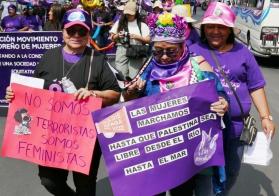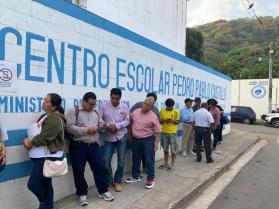Pacific Rim Mining opens legal process against El Salvador under CAFTA laws
Also in this update:
- Obama gives Ambassador Glazer the pink slip
- Minimum wages to rise in El Salvador, economist calls the increases insulting
- FMLN candidate Funes 13 points up in CID-Gallup poll
On December 9, 2008, Canadian-based Pacific Rim Mining Corp. filed a Notice of Intent (NOI) to begin arbitration proceedings against the government of El Salvador. The NOI was filed under Central America-Dominican Republic-United States of America Free Trade Agreement (CAFTA-DR) laws, and serves as the first step in opening up legal proceedings against El Salvador (Canada is not a member of CAFTA but the arbitration would be filed under its US-based subsidiary, Pac Rim Cayman.) The company and country will have 90 days to amicably resolve their dispute. If no resolution is reached by March 9, 2009 just six days before the Salvadoran presidential election Pacific Rim can then open arbitration proceedings under the Convention on the Settlement of Investment Disputes Between States and Nationals of Other States and under the Rules of Procedure for Arbitration Proceedings of the International Centre for Settlement of Investment Disputes (ICSID)an affiliate of the World Bank.
Pacific Rim maintains that it has invested over $75 million dollars in the El Dorado mining project and that there is potential for huge returns and the creation of new jobs. The company claims that, despite its compliance with all laws, the government of El Salvador has failed to grant the permits to begin to exploit the gold and silver mine. An eventual lawsuit is expected to demand several hundred million dollars in damages from El Salvador, an amount that would further damage a country that is already in a dire economic situation, in part due to the effects of the CAFTA-DR accord.
Citizens' organizations in El Salvador have come out very strongly against mining, and specifically against the El Dorado project. Environmentalists contend that the project would lead to acid drainage, water pollution, and the evaporation of cyanide, thus devastating the environment and public health. The I Reject Metal Mining campaign is a combined effort of a broad spectrum of environmental, labor rights, and community organizations that has held many demonstrations and educational events throughout the country. Some political analysts have suggested that the timing of the NOI, putting the end of the 90-day grace period just days before the presidential elections, opens the possibility that the governing Nationalist Republican Alliance (ARENA) party could claim that a victory by the leftist Farabundo Martí National Liberation Front (FMLN) party would open El Salvador to losing the several hundred million dollar lawsuit.
Obama gives Ambassador Glazer the pink slip
On December 3, US President-elect Barack Obama announced that, as of his inauguration, all US ambassadors that were politically appointed by the Bush Administration should vacate their posts. US Ambassador to El Salvador Charles Glazer, a Bush political appointee, is one of the ambassadors that have been asked to relinquish their positions on January 20, 2009.
Many within the opposition political and social movements in El Salvador view Obamas victory in November as a blow to the ARENA party in the lead-up to El Salvadors 2009 municipal, legislative, and presidential elections. The dismissal of Ambassador Glazer reinforces this notion. Glazer, who has been the ambassador since January 16, 2007, has spent the last two years fortifying a close relationship between El Salvadors governing right-wing Nationalist Republican Alliance (ARENA) party and the Bush Administration.
In a June 2008 meeting with a CISPES delegation, Ambassador Glazer admitted to intervention by the US on behalf of the ARENA party during the 2004 Salvadoran presidential elections. However, he expressed hostility towards the delegation throughout the meeting and dismissed the delegates' concerns about intervention and potential fraud in the 2009 elections, as well as concerns about documented cases of human rights abuses in the country.
Minimum wages to rise in El Salvador, economist calls the increases insulting
In the first week of December, the Minimum Wage Council of El Salvador agreed to an increase in minimum wages that will be effective on January 1, 2009. Economist Raúl Moreno, research coordinator of the Foundation for the Study of the Application of Law (FESPAD), called the increase of 8% for the industrial, commercial, agricultural, and service sectors and 4% for textile workers insulting. Workers in the commercial sector will only see their monthly salary go from $192.30 to $207.68, the industrial sector from $188.10 to $203.15, and the textile sector from $167.10 to $173.78. These wages are still significantly lower than the estimated $360 basic cost of living, which only includes food costs and a fraction of the costs of basic services and goods. Moreno expressed concern that minimum wage increases should be paired with responsible regulation of the market, warning that otherwise the trickle-down effect will also appear and increase the costs of many goods.
Former sweatshop worker-turned-union organizer Estela Ramirez explained that that the increase is a joke and shows that the government couldn't care less about us, particularly the sweatshop workers. El Salvadors Central Reserve Bank reports that workers salaries only make up 32% of the gross domestic product (GDP) of the country, while business profits make up 62% of the Salvadoran GDP. The businesses keep making money while the government does nothing to lower the high costs of food and lets our families starve. The raises are not in accordance with the cost of living, Ramirez said.
The minimum wage increase comes at a time when all political parties are in the midst of campaigning for the upcoming municipal and legislative elections in January of 2009 and the presidential elections in March of 2009, causing some to believe that the motive of the increase is to bolster support for the governing right-wing Nationalist Republican Alliance (ARENA) party, which is lagging behind the left-wing Farabundo Martí National Liberation Front (FMLN) in the latest presidential polls, as well as many municipal and legislative races.
FMLN candidate Funes 13 points up in CID-Gallup poll
The latest poll by international polling firm CID-Gallup, conducted November 15-23 and released on December 3, 2008, shows the Farabundo Martí National Liberation Front (FMLN) presidential candidate, Mauricio Funes, with a 13 point lead over the governing Nationalist Republican Alliance (ARENA) partys candidate, Rodrigo Ávila. When asked which presidential candidate they would vote for if the elections were held today, 44% of those polled selected Funes, while only 31% selected Avila. Another 19% were undecided and 5.9% would vote for candidates of the Party for National Conciliation (PCN) or the Christian Democrat Party (PDC).
Reaction among civil society organizations, and on the streets of San Salvador, echoes the poll's findings. A representative of the Movement of Technicians and Intellectuals of El Salvador (MPTIES) recently stated that, for 20 years, El Salvador has been governed by the same right wing party, which has applied policies that benefit a few, rather than the poor. A street vendor, who did not want to be identified, said We cant continue to vote for a party [ARENA] that does not identify with us [the people]. They are mercenaries. We should vote for change, and that is the FMLN.
Funes continued success in the polls demonstrates the current unity and strength of the FMLN party as the municipal, legislative, and presidential elections of 2009 approach.
Funes has drawn in many members of the population who were not previously members of the FMLN party with his platform of change and hope, which focuses on increased social investment and generating more jobs in the country.
Thus far, ARENA candidate Ávila, former chief of the National Civilian Police, has failed to unite or excite the Salvadoran right and continues to lag in the polls. The nomination of ARENAs vice-presidential candidate, Arturo Zablah who had previously criticized the right-wing party and insisted it was imperative to remove ARENA from power further illustrates the divisions created by the failed policies of 20 years of ARENA governance.

 "I am a CISPES supporter because continuing to fight for social justice and a more people-centered country means continuing the dream and sacrifice of thousands of my fellow Salvadorans who died for that vision.” - Padre Carlos, New York City
"I am a CISPES supporter because continuing to fight for social justice and a more people-centered country means continuing the dream and sacrifice of thousands of my fellow Salvadorans who died for that vision.” - Padre Carlos, New York City

